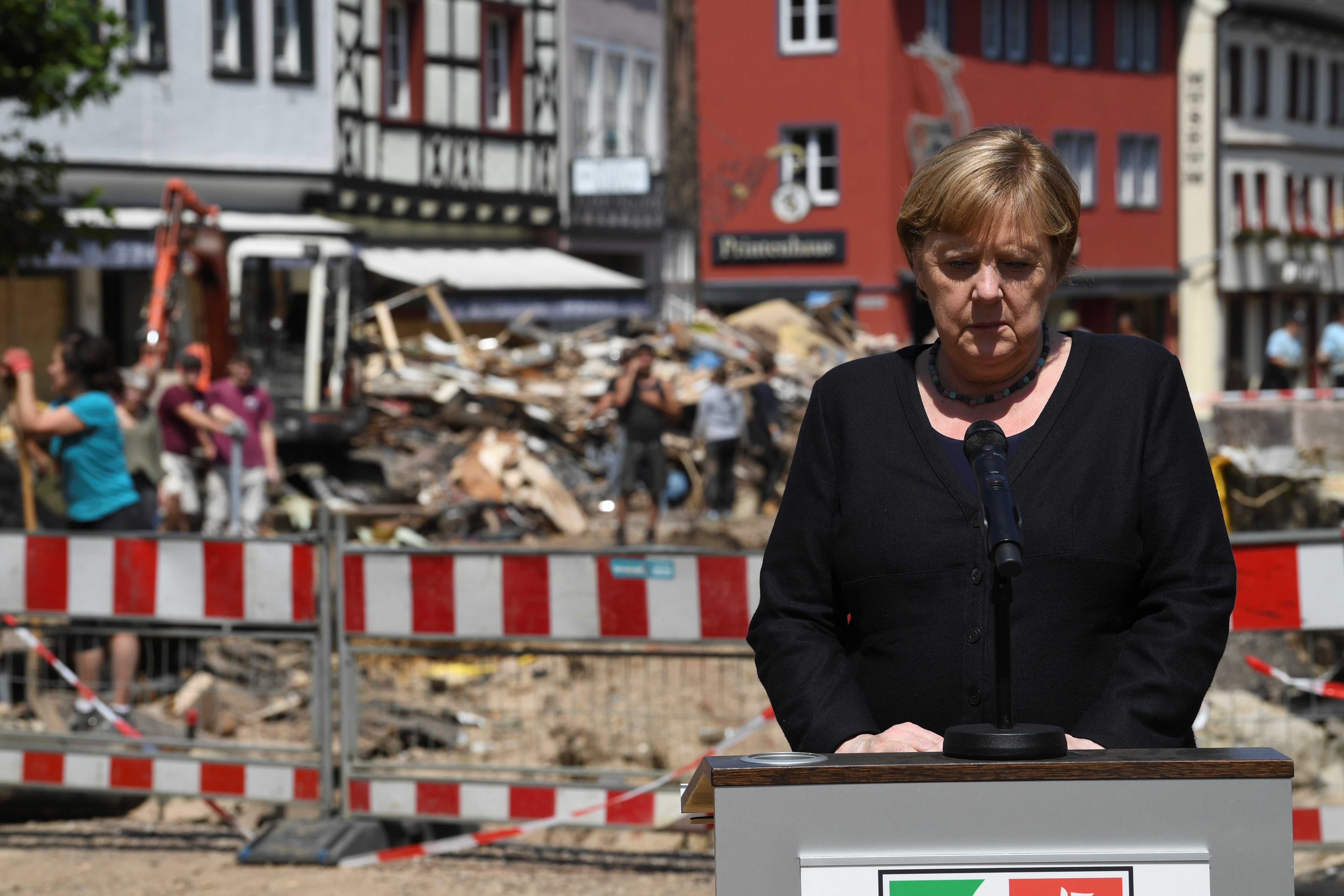Officials accused of negligence as Germany turns to EU for financial help amid flood devastation
Angela Merkel, ‘horrified’ at the level of damage, tried to defuse criticism of poor preparedness and insufficient warnings

Your support helps us to tell the story
From reproductive rights to climate change to Big Tech, The Independent is on the ground when the story is developing. Whether it's investigating the financials of Elon Musk's pro-Trump PAC or producing our latest documentary, 'The A Word', which shines a light on the American women fighting for reproductive rights, we know how important it is to parse out the facts from the messaging.
At such a critical moment in US history, we need reporters on the ground. Your donation allows us to keep sending journalists to speak to both sides of the story.
The Independent is trusted by Americans across the entire political spectrum. And unlike many other quality news outlets, we choose not to lock Americans out of our reporting and analysis with paywalls. We believe quality journalism should be available to everyone, paid for by those who can afford it.
Your support makes all the difference.Accusations that German authorities were negligent in failing to warn the public about potentially perilous flooding last week that killed at least 165 people once again eclipsed recovery efforts on Tuesday even as Chancellor Angela Merkel promised massive support for reconstruction.
The row comes amid reports the government would also turn to the European Union for financial aid for the stricken regions.
Senior government officials denied charges of not doing enough to alert people in the affected regions in advance of the heavy flooding late last week that devastated dozens of picturesque towns and villages in hilly wine-growing regions west of the Rhine River. The pressure on German officials mounted, although many eyewitness survivors said the flash floods caught everyone off guard.
The authorities insisted that local warning systems based on the national weather service forecasts had been issued in the days and hours ahead of the country’s most deadly natural disasters since 1962, when 315 people were killed in North Sea flooding in Hamburg.
Ms Merkel, making her second visit in three days to the region, noted she was still shocked by the force of the flooding that was as high as 30 feet in some areas. She said that local officials were calling it the worst in the last 700 years.
“The damage is horrifying,” Merkel told reporters during a visit to the riverside town of Bad Muenstereifel. “So many buildings are inhabitable. I met a lot of people here who’ve lost everything. It’s difficult to talk with words for a town hit as hard as this. The only consolation is that there is so much solidarity among the people here.”
More important than the warm words was Ms Merkel’s promise to pull out the stops to push through a lightning-quick 400-million euro emergency rescue program at a cabinet meeting in Berlin on Wednesday. She said she hoped rescue funds would be available within days. German officials also said they hoped to tap into the EU’s solidarity fund for financial aid.
“No words can describe the suffering and destruction,” EU Commission president Ursula von der Leyen said on Twitter. “The EU Commission stands with the communities building and will support in any way we can.”
Not only did Germany’s pride in its well-engineered infrastructure take a heavy hit but also losing out was its reputation for efficiency and organization.
The flash flooding in Germany buckled roads, destroyed gas lines, crushed bridges and buildings, and demolished countless trucks and cars in its path.
More than 600 kilometres of rails were damaged, as were 80 rail stations, Deutsche Bahn national railways said on Tuesday. There were still widespread disruptions across the western rim of the country nearly a week after the storm hit.
The first exact weather warning that Germany was going to be hit by heavy rains that could trigger local flooding arrived at Germany’s Meteorological Service on 12 July, or days before the deadly flash flooding began on 15 July. But those warnings went largely unheeded, and the country’s public television networks also failed to alert their viewers to the imminent danger. The European Flood Awareness System also issued the first of its 25 flooding alerts on 10 July.
Defending the government’s alarm system, Armin Schuster said his Federal Office for Civil Protection agency had issued more than 150 warnings via phone applications and the media. “The warning infrastructure was not our problem,” he said. “But rather the effectiveness with which authorities and the public reacted to these warnings.”
Merkel tried to defuse the criticism of poor preparedness and insufficient warnings. However, she acknowledged that they are considering introducing a more effective system of alerts via mobile phones known as Cell Broadcasts to warn a specific region of any imminent threat. “This was flooding that defies our imagination,” she said.
Join our commenting forum
Join thought-provoking conversations, follow other Independent readers and see their replies
Comments